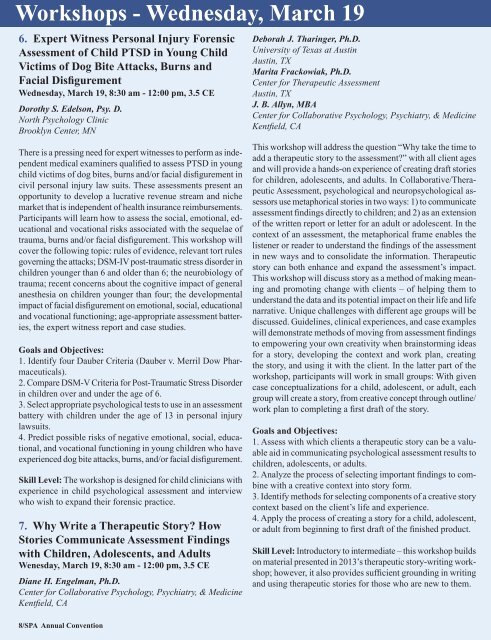6xOUtLU0d
6xOUtLU0d
6xOUtLU0d
You also want an ePaper? Increase the reach of your titles
YUMPU automatically turns print PDFs into web optimized ePapers that Google loves.
Workshops - Wednesday, March 19<br />
6. Expert Witness Personal Injury Forensic<br />
Assessment of Child PTSD in Young Child<br />
Victims of Dog Bite Attacks, Burns and<br />
Facial Disfigurement<br />
Wednesday, March 19, 8:30 am - 12:00 pm, 3.5 CE<br />
Dorothy S. Edelson, Psy. D.<br />
North Psychology Clinic<br />
Brooklyn Center, MN<br />
There is a pressing need for expert witnesses to perform as independent<br />
medical examiners qualified to assess PTSD in young<br />
child victims of dog bites, burns and/or facial disfigurement in<br />
civil personal injury law suits. These assessments present an<br />
opportunity to develop a lucrative revenue stream and niche<br />
market that is independent of health insurance reimbursements.<br />
Participants will learn how to assess the social, emotional, educational<br />
and vocational risks associated with the sequelae of<br />
trauma, burns and/or facial disfigurement. This workshop will<br />
cover the following topic: rules of evidence, relevant tort rules<br />
governing the attacks; DSM-IV post-traumatic stress disorder in<br />
children younger than 6 and older than 6; the neurobiology of<br />
trauma; recent concerns about the cognitive impact of general<br />
anesthesia on children younger than four; the developmental<br />
impact of facial disfigurement on emotional, social, educational<br />
and vocational functioning; age-appropriate assessment batteries,<br />
the expert witness report and case studies.<br />
Goals and Objectives:<br />
1. Identify four Dauber Criteria (Dauber v. Merril Dow Pharmaceuticals).<br />
2. Compare DSM-V Criteria for Post-Traumatic Stress Disorder<br />
in children over and under the age of 6.<br />
3. Select appropriate psychological tests to use in an assessment<br />
battery with children under the age of 13 in personal injury<br />
lawsuits.<br />
4. Predict possible risks of negative emotional, social, educational,<br />
and vocational functioning in young children who have<br />
experienced dog bite attacks, burns, and/or facial disfigurement.<br />
Skill Level: The workshop is designed for child clinicians with<br />
experience in child psychological assessment and interview<br />
who wish to expand their forensic practice.<br />
7. Why Write a Therapeutic Story? How<br />
Stories Communicate Assessment Findings<br />
with Children, Adolescents, and Adults<br />
Wenesday, March 19, 8:30 am - 12:00 pm, 3.5 CE<br />
Diane H. Engelman, Ph.D.<br />
Center for Collaborative Psychology, Psychiatry, & Medicine<br />
Kentfield, CA<br />
Deborah J. Tharinger, Ph.D.<br />
University of Texas at Austin<br />
Austin, TX<br />
Marita Frackowiak, Ph.D.<br />
Center for Therapeutic Assessment<br />
Austin, TX<br />
J. B. Allyn, MBA<br />
Center for Collaborative Psychology, Psychiatry, & Medicine<br />
Kentfield, CA<br />
This workshop will address the question “Why take the time to<br />
add a therapeutic story to the assessment?” with all client ages<br />
and will provide a hands-on experience of creating draft stories<br />
for children, adolescents, and adults. In Collaborative/Therapeutic<br />
Assessment, psychological and neuropsychological assessors<br />
use metaphorical stories in two ways: 1) to communicate<br />
assessment findings directly to children; and 2) as an extension<br />
of the written report or letter for an adult or adolescent. In the<br />
context of an assessment, the metaphorical frame enables the<br />
listener or reader to understand the findings of the assessment<br />
in new ways and to consolidate the information. Therapeutic<br />
story can both enhance and expand the assessment’s impact.<br />
This workshop will discuss story as a method of making meaning<br />
and promoting change with clients – of helping them to<br />
understand the data and its potential impact on their life and life<br />
narrative. Unique challenges with different age groups will be<br />
discussed. Guidelines, clinical experiences, and case examples<br />
will demonstrate methods of moving from assessment findings<br />
to empowering your own creativity when brainstorming ideas<br />
for a story, developing the context and work plan, creating<br />
the story, and using it with the client. In the latter part of the<br />
workshop, participants will work in small groups: With given<br />
case conceptualizations for a child, adolescent, or adult, each<br />
group will create a story, from creative concept through outline/<br />
work plan to completing a first draft of the story.<br />
Goals and Objectives:<br />
1. Assess with which clients a therapeutic story can be a valuable<br />
aid in communicating psychological assessment results to<br />
children, adolescents, or adults.<br />
2. Analyze the process of selecting important findings to combine<br />
with a creative context into story form.<br />
3. Identify methods for selecting components of a creative story<br />
context based on the client’s life and experience.<br />
4. Apply the process of creating a story for a child, adolescent,<br />
or adult from beginning to first draft of the finished product.<br />
Skill Level: Introductory to intermediate – this workshop builds<br />
on material presented in 2013’s therapeutic story-writing workshop;<br />
however, it also provides sufficient grounding in writing<br />
and using therapeutic stories for those who are new to them.<br />
8/SPA Annual Convention


